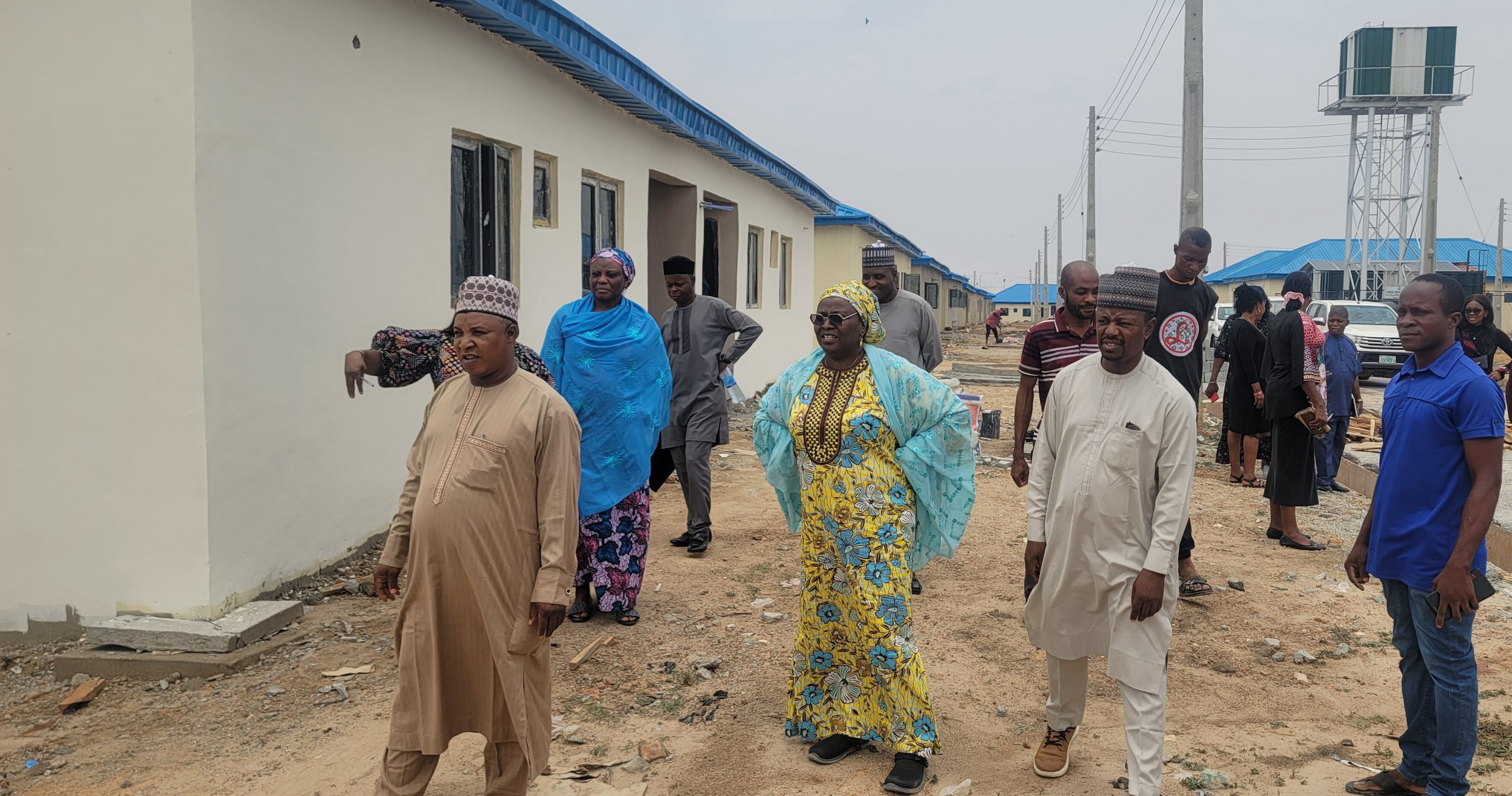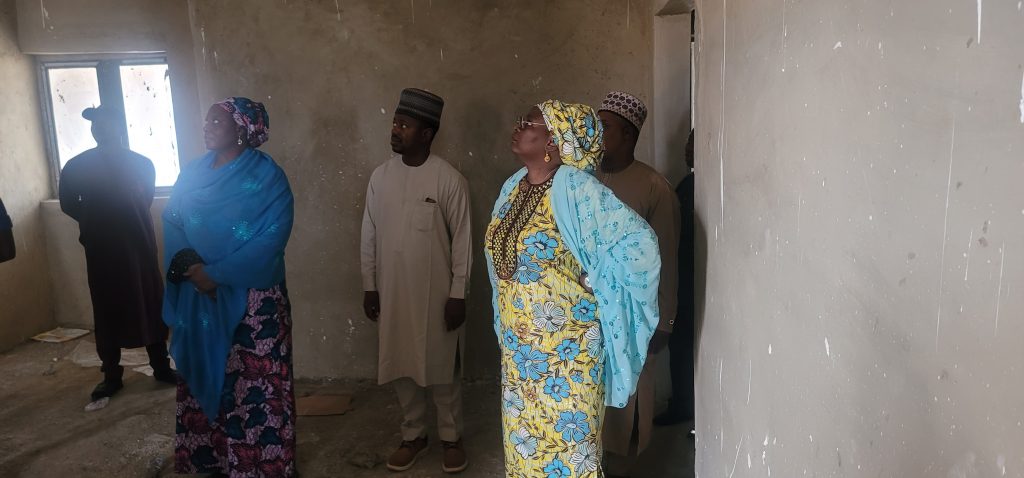Business
FGSHLB Solicits More Funds to Provide Affordable Homes for Federal Civil Servants

…Inspects Housing Projects, Reaffirms Commitment to Affordable Homes
Joel Ajayi
In a renewed push to provide affordable housing for federal civil servants, the Executive Secretary of the Federal Government Staff Housing Loan Board (FGSHLB), Hajiya Salamatu Ahmed, has called for increased funding to accelerate ongoing housing projects across the country.


During a recent inspection tour of housing developments in Gwagwalada, Kuje, and Karachi within the Federal Capital Territory (FCT), as well as in Nasarawa State, Hajiya Ahmed reaffirmed the board’s commitment to delivering quality and affordable homes to civil servants.
She expressed satisfaction with the progress of the projects, particularly highlighting the Dukpa Gwagwalada site, which features 20 units of 3-bedroom apartments nearing completion.
The Kuje prototype project includes 48 units of 2-bedroom flats, six 3-bedroom flats, and six duplexes, while the Karachi project in Nasarawa boasts 45 units comprising 3-bedroom flats, 2-bedroom flats, and semi-detached bungalows.
“I am impressed with the quality of materials and the pace of work. We expect the estates to be ready for commissioning by June this year,” Ahmed stated.
Stressing the affordability of the homes, she noted that a 2-bedroom bungalow costs ₦17 million, a 3-bedroom flat ₦22 million, and a 3-bedroom duplex ₦30 million—prices tailored to civil servants’ budgets. However, she emphasized that funding limitations remain a major obstacle.
“We are only able to execute these projects in phases due to limited funding. To meet the growing demand and expand to other states, we urgently need more financial support,” she appealed.
She also pointed out the challenges faced by many civil servants who reside far from their workplaces due to high rent in Abuja, resulting in heavy transportation costs and financial strain.
Ahmed explained that while the board relies solely on annual government budget allocations, attempts to secure private sector funding have not materialized due to high-interest rates, which are unaffordable for civil servants earning modest salaries.
“A 10-15% interest loan is not feasible for a level 8 civil servant earning just over ₦100,000 monthly. Through our scheme, loans are offered at just 3% interest, with convenient salary deductions,” she noted.
Highlighting the importance of land availability in reducing construction costs, Ahmed commended the provision of free land in Gwagwalada and called on other states to follow suit to enable wider access to affordable housing.
She concluded by urging the government to prioritize increased funding for FGSHLB, stating: “Every federal government worker deserves a decent home. With better funding, we can make this a reality for more civil servants across the country.”
At the Kuje project site, developer Mr. Rotimi Fasan confirmed that infrastructure such as roads, water systems, green spaces, and sewage facilities are already in place and ready for use.
The projects are being executed under the FISH Programme—an initiative of the Office of the Head of Civil Service of the Federation (OHCSF) which aims to provide affordable housing for civil servants through coordinated efforts involving land allocation, inter-ministerial collaboration, and infrastructure support.
While assuring the timely completion of the Karachi Housing Unit, the Project Manager, Felix Oluwatosin Arowowade, pledged that all 45 units would be ready by the end of June.
“We have developed a functional road network, a water system, green areas, and a playground for children. As you can see, work is progressing steadily, and by the grace of God, the Karachi Housing Unit will be ready for commissioning by the end of June,” he stated.
Business
LOTUS Bank, REA Partner To Deepen Renewable Energy Access In Nigeria

Joel Ajayi
LOTUS Bank Limited, one of Nigeria’s leading ethical, non-interest banking service providers, has reaffirmed its commitment to inclusive, sustainable development of the country through a strategic partnership with the Rural Electrification Agency (REA), aimed at expanding access to renewable energy solutions across underserved communities.
In a demonstration of its commitment, LOTUS Bank signed a Memorandum of Understanding (MoU) with the REA on Monday in Abuja, under which it will provide accessible funding of up to N100 billion to empower certified Renewable Energy Service Companies (RESCOS).
Speaking during the signing of the deal, Managing Director/CEO of LOTUS Bank, Dr. Isiaka Ajani-Lawal, described the collaboration as a clear reflection of the Bank’s mission to harness ethical finance to address critical, important and national development needs.
The Banker clarified: “LOTUS Bank was established to redefine the impact that financial institutions can have on the society we serve – not simply through financing, but through partnership, empowerment, and shared prosperity.
“Our involvement with REA and the DARES program underscores our commitment to supporting sustainable development goals, while driving financial inclusion across Nigeria.
We believe non-interest finance must go beyond innovation — it must deliver tangible socio-economic value to all segments of society, Ajani-Lawal assured.
In his remarks at the event, MD/CEO of the REA, Abba Abubakar Aliyu, emphasized the importance of addressing financing barriers for off-grid energy developers.
He said: “While Nigeria has made strides in expanding energy access, financing remains a key constraint for RESCOs. Collaborations like this are essential in unlocking private sector investment and delivering sustainable energy solutions at scale.”
The partnership of the Agency and the Bank is expected to accelerate clean energy project delivery, reduce financing bottlenecks, and stimulate private sector participation — a development that supports Nigeria’s National Electrification Strategy and Implementation Plan (NESIP) and contributes to Sustainable Development Goal 7 (SDG7) for affordable, reliable, and clean energy for all.
LOTUS Bank’s expansion into renewable energy financing aligns with its broader strategy to deepen ethical and inclusive finance by supporting initiatives that have measurable social, environmental, and economic impact.
Since its inception in 2021, the Bank has positioned itself as a “Bank for all” with a strong focus on financial inclusion through innovative non-interest products designed for individuals, women, youth, and MSMEs; community empowerment and CSR initiatives; expansion of digital accessibility and making ethical banking more accessible to people in urban and underserved locations nationwide; and financial literacy campaigns and stakeholder engagement to deepen understanding and adoption of non-interest banking principles.
In recognition of its role in deepening financial inclusion and ethical finance, LOTUS Bank was recently named the “Best Ethical and Financial Inclusion Bank of the Year” at the 2025 BusinessDay Banks and Other Financial Institutions (BAFI) Awards, highlighting the institution’s leadership in inclusive financial innovation
-

 Featured7 years ago
Featured7 years agoLampard Names New Chelsea Manager
-

 Featured6 years ago
Featured6 years agoFG To Extends Lockdown In FCT, Lagos Ogun states For 7days
-

 Featured6 years ago
Featured6 years agoChildren Custody: Court Adjourns Mike Ezuruonye, Wife’s Case To April 7
-

 Featured7 years ago
Featured7 years agoNYSC Dismisses Report Of DG’s Plan To Islamize Benue Orientation Camp
-

 Featured4 years ago
Featured4 years agoTransfer Saga: How Mikel Obi Refused to compensate me After I Linked Him Worth $4m Deal In Kuwait SC – Okafor
-
Sports3 years ago
TINUBU LAMBAST DELE MOMODU
-

 News1 year ago
News1 year agoZulu to Super Eagles B team, President Tinubu is happy with you
-
Featured6 years ago
Board urges FG to establish one-stop rehabilitation centres in 6 geopolitical zones
